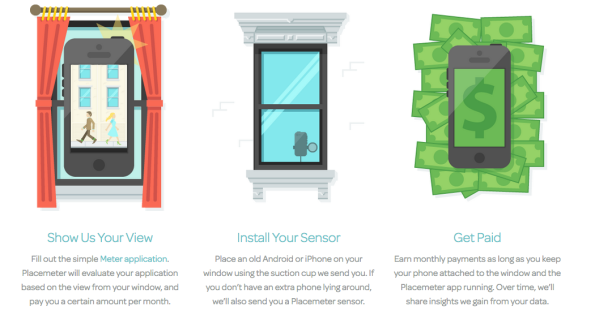Surveillance in NYC
There’s a CNN video news story explaining how the NYC Mayor’s Office of Data Analytics is working with private start-up Placemeter to count and categorize New Yorkers, often with the help of private citizens who install cameras in their windows. Here’s a screenshot from the Placemeter website:
You should watch the video and decide for yourself whether this is a good idea.
Personally, it disturbs me, but perhaps because of my priors on how much we can trust other people with our data, especially when it’s in private hands.
To be more precise, there is, in my opinion, a contradiction coming from the Placemeter representatives. On the one hand they try to make us feel safe by saying that, after gleaning a body count with their video tapes, they dump the data. But then they turn around and say that, in addition to counting people, they will also categorize people: gender, age, whether they are carrying a shopping bag or pushing strollers.
That’s what they are talking about anyway, but who knows what else? Race? Weight? Will they use face recognition software? Who will they sell such information to? At some point, after mining videos enough, it might not matter if they delete the footage afterwards.
Since they are a private company I don’t think such information on their data methodologies will be accessible to us via Freedom of Information Laws either. Or, let me put that another way. I hope that MODA sets up their contract so that such information is accessible via FOIL requests.




This whole “surveillance state” issue is getting spookier…..
LikeLike
Even if they were magically trustworthy, I wonder how easy it is to de-anonymize head count type data. Are there known results about inferring likely paths of a person from the timings of increments and decrements? I’m reminded of traffic analysis attacks against something like Tor, but I don’t really know anything about that.
LikeLike
As is nearly always the case, you raise some thought provoking questions that have no easy answers. Just because we CAN collect and aggregate data doesn’t mean doing so is a good thing… and just because collecting data with a phalanx of cameras is efficient doesn’t mean it is effective… It seems to me that every time we turn a function over to a “machine” that once was the purview of a good neighbor or a trusted local law enforcement official or agent (e.g. keeping an eye out for people who might be up to no good), we diminish the need for citizens to look out for each other and the need for personal contact with policemen, social workers, probation officers, etc. It is arguably more efficient to have cameras everywhere than having policemen everywhere, but it would be better yet if we could somehow develop the kinds of neighborhood networks that we reminisce about.
Technology as a means of achieving efficiency and cost savings is depersonalizing our world more and more. We no longer greet bank tellers, grocery store clerks, or book store owners…. and my 2 year old grandson will marvel when I tell him that such things actually existed in my lifetime— assuming I can get him to look up from his Kindle.
LikeLike
My first reaction to being categorized is NOYFB. It really freaks me out because it’s the beginning of a path to totalitarianism. Doesn’t matter whether it’s a private company or the government. Starting to look like the communist regimes in Eastern Europe after WWII. Now if they really want to use technology “for good” let them photograph bicycle riders who run red-lights or who almost take out pedestrians trying to cross on a green and send e-tickets to the violators..
LikeLike
I see it in black and white. Private and government interests cannot be trusted to guard our privacy. Everything they want to do is at odds with that notion. And they will gradually win. I think Felix was uncharacteristically “off” on the podcast regarding these issues. One does not need to witness dystopian behavior to rightfully guard against what can be easily imagined.
LikeLike
There are so many assumptions underlying Placemeter that are questionable. One example: since when does having more data allow more “efficient” control of a chaotic and fluid system? If a restaurant is always busy, they don’t benefit. If Placemeter shows an unusually short line, who benefits? Those living closest, because they can get there BEFORE a tsunami of oncoming eaters generated by Placemeter. So it would seem that the same people benefit as before when they just looked out their window, only now you would have a surge of restless, questing humanity wasting time and energy flowing from one illusory “opportunity” to another, washing up and drowning neighborhoods in frustration and bad temper. Not much of an improvement.
LikeLike
In other words, it’s a pyramid scheme?
LikeLike
A high tech version of Cuba under Fidel.
LikeLike